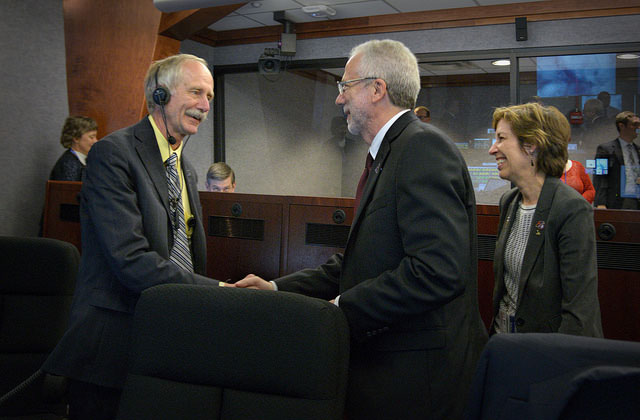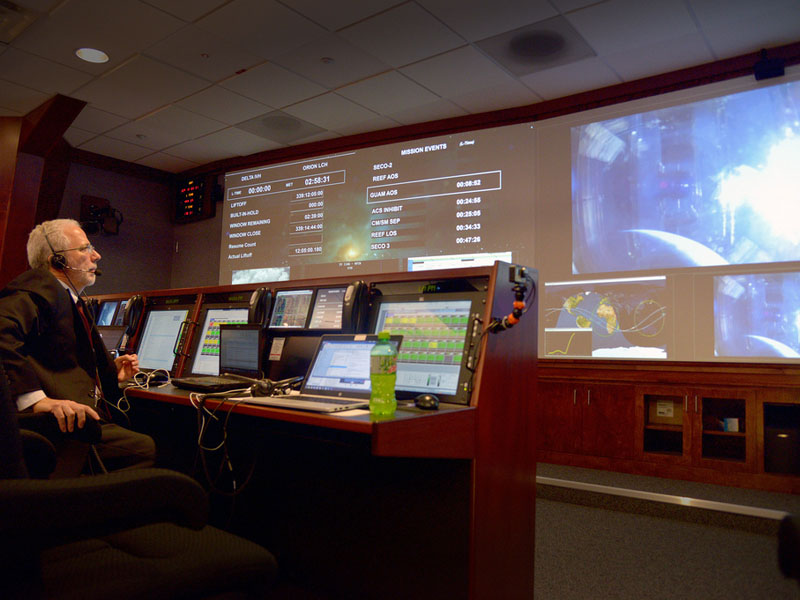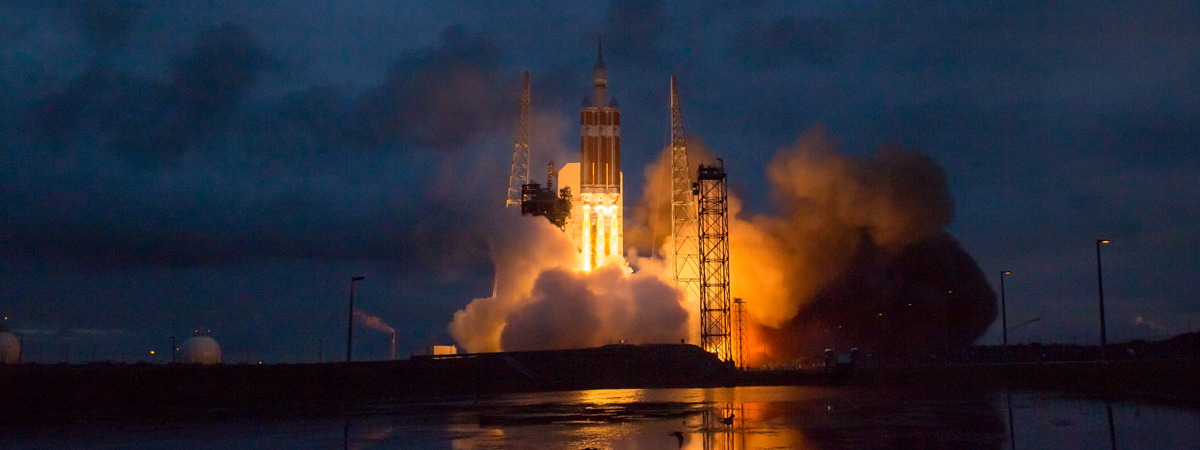Space Hunters
Space Hunters
| Author: | William Meiners |
|---|---|
| Magazine Section: | Our People, Our Culture |
| College or School: | CoE |
| Article Type: | Issue Feature |
| Feature Intro: | Purdue aeronautics and astronautics graduates play critical roles in the historic Orion space launch. |
Orion flew deeper into space on a test flight mission than any crewed vehicle since the Apollo missions more than 40 years ago. William Gerstenmaier (BSAAE ’77, OAE ’03, DEA ’07), associate administrator for the Human Exploration and Operations Directorate; Mark Geyer (BSAAE ’82, MSAAE ’83), recently named deputy director of the Johnson Space Center; and Julie Kramer White (BSAAE ’90), Orion program chief engineer, are a trio of high-ranking NASA officials who helped ensure Orion’s success from launch to landing.

Overseeing complex engineering activities
As head of the human spaceflight directorate, Gerstenmaier helps balance the needs of Orion against NASA’s other spaceflight programs. He also represents the program to the legislative and executive branches of the U.S. government and oversees the barter with the European Space Agency for the service module being developed for Orion.
“The engineering background I received at Purdue helped provide me with the knowledge needed to oversee a highly complex engineering activity,” Gerstenmaier says. “I have an engineering understanding of the trades being discussed and represent the program to a less technical community. My Purdue education was well rounded and trained me to balance many competing priorities.”
Dan Dumbacher (BSME ’81), professor of engineering practice in aeronautics and astronautics, returned to his alma mater in 2014 after a 33-year career at NASA. He knows something about balancing competing priorities. In his most recent post as deputy associate administrator in the Exploration Systems Development Division, Dumbacher led teams throughout Orion’s history, which dates back some 10 years. Through policy shifts and a spaceflight hiatus, Orion still fit the bill for taking people deep into space and returning them home.
Back at Purdue, Dumbacher is helping establish the Purdue Systems Collaboratory. “From my perspective, particularly in my last five or six years at NASA,” he says, “I know that as much as we need the technical experts to understand all the fine intricate details of the technical theory and application, we also need people that understand the technical and can work across multiple disciplines. The Purdue Systems Collaboratory is intended to move that forward.”

Succeeding in stressful environments
Alums hold various positions ranging from avionics to control systems to propulsion and beyond. All told, there are more than 60 Purdue graduates directly involved in the Orion program through work at NASA, Lockheed Martin and Honeywell. Engineers will take all the data from the test flight and put it into an Orion spacecraft that will fly on the first test flight of NASA’s new Space Launch System rocket. That next mission, paving the way for deeper flights, also will be a test flight without astronauts, Dumbacher says.
Dumbacher believes working with fellow Purdue alums at NASA provided some common ground in building successful teams. “Even though it’s technical work, all of it is fully dependent on personal relationships,” he says. “With a Purdue engineering degree you end up with a certain language and understanding in common and that helps with the communication side of it.”
Since 2007, Geyer was responsible for the day-to-day management of the Orion program, which has included the development and integration of the system. Like Dumbacher, Geyer believes that a Purdue program that focused on applications with high expectations prepared him for his work at NASA’s Johnson Space Center.
“I learned how to solve difficult engineering problems in the courses we had at Purdue,” says Geyer, who believes simply having the chance to make mistakes and mature in college helped guide him to adulthood. “I also learned how to succeed in a stressful environment, how to build collaborative relationships with fellow engineers, and how to interact and work with people in authority.”

Exceeding expectations
For many NASA employees, whether they’re working behind the scenes, at the ground controls or flying aboard a spacecraft, the idea of working on space challenges has been a lifelong dream. That was the case with Dumbacher, whose mother tells him he never missed watching a launch on television.
“Certainly you have to have the engineering education to get in the game,” says Dumbacher, who is now even more impressed with the quality of students since his days on campus 34 years ago. “I was lucky enough to have a couple of NASA internships before I graduated, and all I ever wanted to do was work at NASA.”
White combined her mechanical aptitude with a love of science fiction. That call to the frontiers of space resounded early in her childhood. Though she attended Purdue because it was the state school close to home, she admits to later learning about its far-reaching reputation as she began her work at NASA.
As a senior engineering official at the Johnson Space Center, White works as a liaison between engineering and program functions, serves as an advocate for engineering staff, and is the overall technical advisor to the program manager. President Barack Obama recognized her specifically for her leadership role in Orion’s test flight. A future Mars landing, the president says, with the Americans first on the planet, would also be indebted to White.
Even with high praise from the commander-in-chief, White remains humble, perhaps reflective of her Midwestern roots. “My education at Purdue taught me a lot of great fundamental engineering,” White says. “However, the skills I value most are general leadership and problem-solving skills.”
White also stresses perseverance, along with learning how to prioritize, manage stress and work in teams — both good ones and not-so-good ones — as keys to success in a demanding, revitalized field seeking to find the farthest reaches of space.

Comments